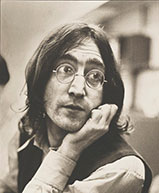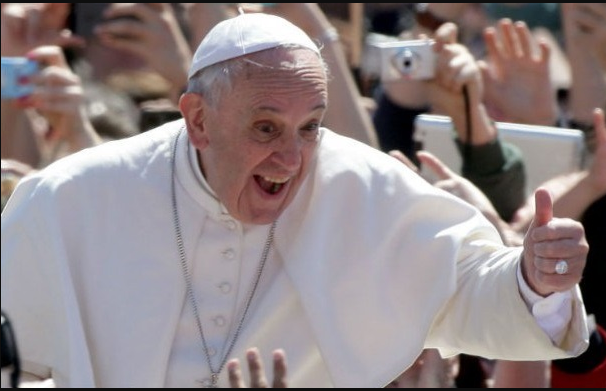|
Pope Francis’s 10-Step Program
to Happiness
|
|
• God • Scripture • Heaven • Faith • Hope • Charity • Love • Religion • The Old Testament • The New Testament • Anything that Jesus Christ did, said, taught, or commanded. |
The Formula for Happiness — according to Francis:
|
1. “Live and let live.” 2. “Be giving of yourself to others.” 3. “Proceed calmly” in life. 4. Have “a healthy sense of leisure.”
5. “Sundays should
be holidays. 6. “Create dignified jobs for young people.” 7. “Respect and take care of nature.” 8. “Stop being negative.” 9. “Respect others’ beliefs.” 10. “Work for peace.” |
No, this is not “fake news”
You are not experiencing cognitive dissonance. For the head of the Roman Catholic Church of over 1 billion souls, the fulfillment of these 10 “steps” constitutes happiness.
Contrary to what the Church has taught from its inception over 2000 years ago, for Francis, apparently, God is not man’s happiness. He is not even mentioned!

“And no religion, too”
Does it sound familiar?
“Why, now that you mention it!” It is an enervated reiteration
of the lyrics of the Beatles’ John Lennon’s song “Imagine”.
You can find the lyrics
here
. It is, arguably, the anthem of post-Christian man
Different — by a Quantum Leap
Quite different, yes? … I mean, from anything that you may have once learned (or heard rumor of) from that “outdated” Baltimore Catechism that put things in clear and unambiguous perspective, distinctly Catholic, Scriptural, Patristic, and relevant. Here, let us help you. Below are three questions concerning happiness, its nature and the means of its attainment that vastly differ from what Francis would have us believe to the contrary.
Answer: God made us to show forth His goodness and to share
with us His everlasting happiness in Heaven.
Answer: To gain the happiness
of Heaven we must know, love, and serve God in this world.
Answer: God made me to know Him, to love Him, and to serve Him in this world, and to be happy with Him forever in Heaven. |
If you wonder to whom you should
defer, we would suggest that tens of thousands of Saints stand as testimony
— so often indited in the blood of martyrdom — that happiness
is to be found in God alone — to the tedious meanderings of
one man in the Church who appears to find happiness elsewhere than God
— when he ought not, nor encourage others to.
Do we maintain that Pope Francis does not hold that
authentic happiness is to be found in God alone? Ten years after this
scandalous statement, it increasingly appears to be the case. Each successive
year we have found Francis promoting, not so much the authentic Catholic
Faith (which is his job description), as what increasingly appears
to be an an ideology, one rooted in contemporary secular
“values” that derive from and are promoted by a society hostile to God
— values not simply distinct from the Gospels that the Church has consistently
proclaimed and defended for over two millennia, but more alarming still,
opposed to them, especially in the way of sexual ethics and what can
only be construed as pan-ecumenism.
Francis, of course, has made many (very many) absurd and heterodox statements since then — and perhaps that is why we find such utterances so consistently troubling. More and more he appears to be what one close military officer describes as “a loose canon.”
He does not appear to be on a trajectory vectored at arriving at the Gospels anymore so now than he was ten years ago. And given his Petrine office, this continues to be deeply troubling indeed.
Editor
Boston Catholic Journal
Comments? Write us: editor@boston-catholic-journal.com
Totally Faithful to
the Sacred Deposit of Faith entrusted to the
Holy See in Rome
“Scio
opera tua ... quia modicum habes virtutem, et servasti verbum
Meum, nec non negasti Nomen Meum”
Copyright © 2004 - 2026 Boston Catholic Journal. All rights reserved. Unless otherwise stated, permission is granted by the Boston Catholic Journal for the copying and distribution of the articles and audio files under the following conditions: No additions, deletions, or changes are to be made to the text or audio files in any way, and the copies may not be sold for a profit. In the reproduction, in any format of any image, graphic, text, or audio file, attribution must be given to the Boston Catholic Journal.
|






















